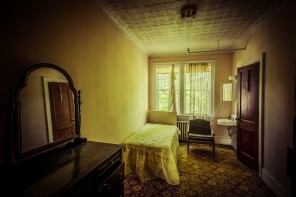I remember exactly where I was the day Terri Schiavo died. I was in my Brooklyn apartment crying my eyes out and making arrangements to go home to Lancaster, Pennsylvania, for the funeral of my beloved 94-year-old grandfather, who had died two days after Easter.
But the funeral the next day would be more about my father than my grandfather; one week before, on Palm Sunday, my sister and I had gathered around the family table to hear our dying father read the contents of his own will. As we grappled with the ramifications of this gathering, the US Senate was passing by unanimous vote—a vote the future president would regret—the Palm Sunday Compromise. The bill (later found unconstitutional) was intended to wrest federal custody of Terri Schiavo, who had been in a persistent vegetative state for 15 years, from her husband, Michael Schiavo, who had won a Florida court order to have his wife’s feeding tube removed.
The TV blared the Senate’s frenzied speeches as my father told us how, after nine and a half years of living with non-Hodgkin’s lymphoma, of brutal chemotherapy, hip and knee replacements, lost hair, wavering health and looming death, he had exhausted all avenues of treatment and was ready to die. We cried ourselves through the week, just as Terri Schiavo’s parents, Robert and Mary Schindler, her siblings, and her husband, Michael, must have cried, knowing that Terri was slowly losing her life. Two days after Easter, when news of Schiavo’s death came, I got the call from my father that his father had died. I knew the one question I wanted to ask him but couldn’t: What is it like to lose your father?
The intertwining of Terri Schiavo’s life, death, and media frenzy with my family’s own grief and loss had an extra poignancy. My father—a hearty, capable working-man, a gun owner, a flag flyer—had repeatedly threatened throughout his diagnosis to hang or shoot himself should he become unable to live alone, should the pain become too much to bear. Fear and a dear friend pushed me to read Final Exit: The Practicalities of Self-Deliverance and Assisted Suicide for the Dying, a bestselling how-to book. If Dad was going to kill himself, I hoped that I could encourage him to do it in a less violent way. I read about starvation and dehydration as proven painless methods of assisted suicide, while my father protested the Republicans’ overreaching attempts to prolong Schiavo’s life unnecessarily. They should have no hand in her death, he said, nor in his.
That week, Dad’s doctor recommended an injection of prednisone to keep him comfortable and miraculously, we embarked on a glorious, unexpected summer together. His thin blond hair, untouched by gray, was golden in the summer sun as he mowed the grass or cut firewood. I watched him smell the warm air of our wooded hollow and study the birds in the feeder with relish. I rode along on the back of his bulldozer as he graded the long farm lane one clear morning in July; he looked over his shoulder at me with a great smile of profound joy to be alive.
Schiavo as a Health Care Talking Point
Once again the death of Terri Schiavo is in the news. In an effort to mobilize “pro-life” activists and the elderly, Republicans and the medical industry are working together to stop the Obama administration’s proposed reform of health care. On June 24, the same day that House Minority Leader John Boehner misleadingly announced that article 1233 of the reform bill could lead to government-sponsored euthanasia, Republican National Committee president, Michael Steele, told Washington News radio that reform would “make Terri Schiavo look like a walk in the park.” Boehner’s statement is a call to mobilization for those who found the death of Terri Schiavo a tragedy; Steele’s statement is an erroneous warning that government intervention may disrupt private health care decisions. Together, they illustrate the contested nature of Terri Schiavo’s legacy in the United States.
“Pro-life” groups have long viewed the removal of Schiavo from artificial nutrition and hydration (ANH) as court-ordered murder. As Wesley J. Smith (a “pro-life” bioethicist and speaker) wrote on his blog, SecondHandSmoke, on March 31, 2009 (the fourth anniversary of Terri Schiavo’s death), “This cruel end was not a necessary death. It was forced upon her by judicial fiat even though she was not terminally ill, did not require a respirator or kidney dialysis, and had a loving family eager to care for her for the rest of her natural life.”
In an article titled “The New Euthanasia” in The American Conservative on Monday, Patrick Buchanan (long-time Republican commentator and strategist) referred to the growing prevalence of what the last Pope called “the culture of death”:
Revulsion to Nazism led to revival of the Christian ideal of the sanctity of all human life and the moral obligation of all to defend it. But the utilitarian idea—of the quality of life trumping the faith-based idea of the sanctity of life—has made a strong comeback.
The failure of Republicans to stop the “premature death” of Terri Schiavo was yet another indication to “pro-life” advocates that the country has moved farther toward institutionalization of unethical practices, of denial of medical rights to the disabled, the elderly, and the sick. As I wrote last week, this belief (and strategy, pointedly couched in Nazi overtones and loaded terms like “euthanasia” and “bureaucracy”) is proving helpful to the activation of the Republicans’ decreased constituency. That the concerns expressed by the increasingly radicalized base are predominantly, at least regarding “euthanasia” and “rationing” of services to the elderly, against government intervention in health care is proving a challenge to the Right’s existing Schiavo narrative. They are hoping that those who thought the Bush administration’s actions in 2005 were political overreaching have, in the intervening four years, forgotten what a partisan issue Terri Schiavo’s death was and agree with the Republican (and medical industry) talking points that government intervention is undesirable, and indeed, deadly. It’s a big gamble. Froma Harrop writes, “This carnival to discredit adult end-of-life care consultations brings them back into dangerous Terri Schiavo territory… The public was appalled, and Republican fortunes started their slide.”
Last week Bobby Schindler, Terri’s brother and a co-founder, along with Terri’s parents, of the Terri Schindler Schiavo Foundation, reacted to Steele’s statement. In a post titled, “Michael Steele: Right on Rationing, Wrong on Reasoning,” he writes “Perhaps Mr. Steele has fallen victim, along with so many others, to the same media spin that implies Congress was intruding on a “private” matter, rather than applauding them for stepping in to protect a disabled woman…”
Indeed, if this perception of Republican action in 2005 is media spin, the media were highly successful. News polls from March of 2005 from both ABC and CBS show overwhelming public disapproval of Republicans’ actions. Eighty-two percent of those polled felt Congress and the president should not have been involved in the matter.
Only 13% felt Congress intervened out of concern for Schiavo, while an astounding 74% felt it was for political reasons. Congress’ and the president’s approval ratings pointedly dropped. When asked if Schiavo’s feeding tube should be removed, 62.1% said yes. When asked if the federal government should intervene, 59.4% said no; although whether this represented disfavor for Republicans or government intervention in general is impossible to determine. 94% of those who agreed that Schiavo’s tube should be removed said they would want the same for themselves in a similar situation, while those who opposed removal were split 45% to 41%, with the former wishing for their own removal. ABC’s reporting noted that the elderly particularly opposed federal intervention in the case and favored removal of Schiavo’s tube. In the aftermath, Americans rushed to complete their own living wills, also called advance directives, in the hopes that they would not be the next Terri Schiavo.
Seemingly aware of public opinion regarding his sister’s case and echoing the current Republican talking points on health care reform, Schindler writes later in his “rebuttal” to Steele, “We are in danger any time health care decisions are taken out of the hands of individual patients and their families and placed into the hands of government bureaucrats whose decisions are based on cutting costs rather than valuing the dignity and equal worth of every human life.” He does not acknowledge that indeed the decision to remove Schiavo from feeding tubes was made by her family: her husband, Michael Schiavo, who opposed the Schindlers’ “pro-life” views of end-of-life issues.
Choice as a Slippery Slope
Opponents to assisted suicide like Wesley J. Smith, who has spoken at anti-euthanasia symposiums with Bobby Schindler, argue that here and now, as technology is so quickly transforming our world, we must be unequivocal in our decisions and laws regarding preservation of life. He writes, “Once we agree that society should facilitate the suicides of some people, suicide prevention as an effective intervention is effectively over.” That our society is not unequivocal, that we prepare our children for sex and tell them not to have it, that we find issues like unconsciousness as “excuses” for assisted suicide, proves that we are an unenlightened people. (In a separate post, referring to a quote from the writer Jane Brody, he remarks that only unenlightened society would label Schiavo a vegetable. “Terri Schiavo was not a carrot or a turnip.” The use of the term “vegetable” for unconscious people is, he writes, like using the “N word”.)
Smith states that what most pained the Schindler family was watching what we can assume he would call equivocal America “slowly dehydrate [Terri Schiavo] to death by court order to the applause of much of society.” The implication is that the pro-life movement is morally superior to general society, persecuted by the likes of those who put to death the innocent, and outside of or above our nation’s democratic processes.
What separates Terri Schiavo’s death from other assisted suicide cases is, of course, personal choice. Even Smith, who opposes choice, has noted that Terri Schiavo’s wishes regarding life-support and artificial nutrition and hydration were unknown, hedging the choice argument much as Sarah Palin (also opposed to choice) did when she publicly praised her daughter, Bristol, for “choosing” to have a child out of wedlock, or when she herself “chose” to have a Down Syndrome baby. While personal choice implies equivocality to Smith, Palin and others who support the “pro-life” platform, speaking to it allows them to perpetuate the “superiority” of those who eschew it. It also broadens their political constituency.
*
Our glorious stolen summer with Dad turned to fall. “I just want to go home and die,” he told his doctor of nearly 10 years. That afternoon, a hospice nurse began her weekly visits. I left my job and prepared to care for Dad until, I hoped, he would peacefully die in his sleep in our family home. He had a living will and hospice visited us regularly, and yet, his was a grueling death. Terminal Restlessness, a common affliction of the dying, prevented us from keeping Dad in bed. He didn’t know where he was. He swung his arms and kicked his legs at us. The morphine hospice had given us was not strong enough to calm him. When the nurse arrived, my sister and I cried with exhaustion. She insisted that we take Dad to hospice where stronger drugs could be administered. A day later, in a private room at the hospice center, after calming drugs, Dad looked out through unseeing, foggy eyes and died. It was not the death he had wanted, nor the home death we had planned for him. Six weeks later, I filled out my own advance directive.



